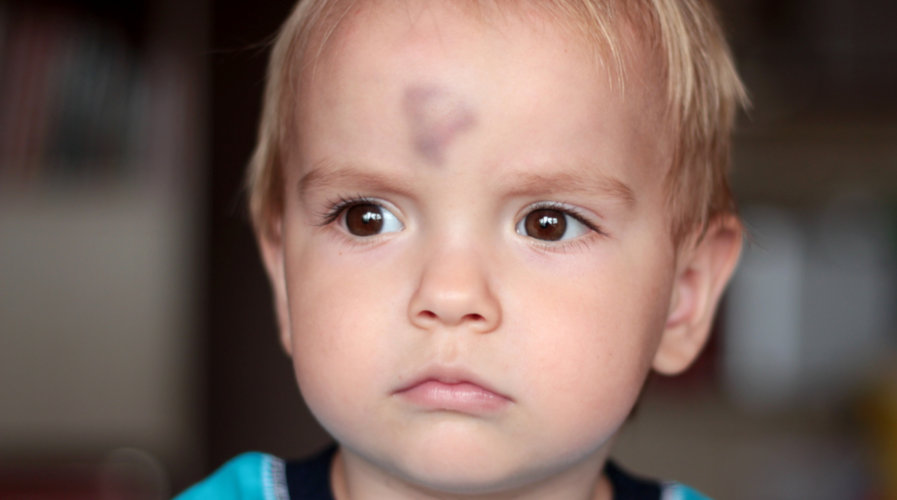What is a Contusion?
Head Injuries
•
Sep 28, 2018

You may have heard an injury labeled a “contusion” by a doctor and thought it sounded serious. However, a contusion is just a common form of hematoma where blood pools outside of the vessel, forming a discolored spot on the surface of the skin, muscle tissue or bone.
In other words, a contusion is a fancy name for a bruise.
Contusion Causes
A contusion is most often caused by some form of trauma or blow to the body. When the blow is strong enough, it can puncture a blood vessel or capillary, causing blood to leak out and clot in the surrounding area. While trauma is the primary cause of bruising, other conditions can cause it as well, such as:
- Microscopic muscle strains or tears
- Bleeding disorders
- Thin skin due to old age
- Blood-thinning medications
Contusion Symptoms
The main contusion symptom is a discolored spot on the skin. It may begin reddish, turn blue or dark purple after a few hours and then fade to grayish green or yellow after a couple of days as it heals. Contusions are often tender to the touch as well, but this symptom should fade as the bruise heals.
Symptoms may change depending on the location of the contusion.
Types of Contusions
Bone Contusions
Most people think of bruises as an issue that’s skin-deep, but bones can be bruised as well. This is referred to as a bone contusion and is often the result of a hard fall or sports injury. The prognosis depends on the severity of the bruise, but in general, it takes anywhere from several days to several months to fully heal.
Bones are mostly made of collagen, which is a flexible, living tissue. When a small injury occurs on the surface of the bone, collagen vessels break, leading to pooling underneath the skin. Bone contusions often look like common skin contusions, but they carry some additional symptoms, including:
- Stiffness
- Joint swelling
- Longer-lasting tenderness
Skin and Muscle Contusions
Skin and muscle contusions, sometimes referred to as soft tissue bruises, are the variety most people are familiar with. Even minor bumps or ankle twists are enough to damage the blood vessels in your soft tissue and cause bruising. Symptoms that are specific to soft tissue contusions include:
- Discolored skin
- Light swelling
- Tenderness
Brain Contusion
A brain, or cerebral, contusion is a mild-to-severe injury that occurs when a bruise develops on brain tissue. It is typically caused by a strong blow to the head, resulting in microhemorrhages, or blood vessel leaks, in the brain tissue. Brain contusion is classified as a traumatic brain injury (TBI), as more severe cases can lead to mental changes or even become life-threatening if left untreated.
Brain contusion symptoms include:
- Dizziness
- Severe headaches
- Insomnia
- Memory loss
- Difficulty concentrating
Loss of consciousness is considered a serious symptom. Prompt medical attention is recommended after head injuries that result in any of the above-listed symptoms.
Treating Contusions With RICE
Though treatment may vary depending on the severity of the contusion, most tissue and bone contusions will heal on their own over time. To treat common contusions, simply remember R.I.C.E.:
- Rest the contused area when possible.
- Ice the bruise with a wrapped ice pack for 10 to 20 minutes at a time, several times a day.
- Compress the bruise if there is swelling using a bandage.
- Elevate the bruised area if possible.
When to Be Concerned About Contusions
While most contusions are minor, there are certain symptoms or events that require an urgent visit with a health care professional, for example, if:
- The bruise does not heal within two weeks
- Bruising occurs for no reason or very easily
- Bruising is accompanied by severe pain or swelling
- You develop frequent, large bruises
- You notice abnormal bleeding from the gums or nose along with bruising
Emergency Room Services in Texas and Colorado Springs
While most bumps and bruises are not serious, some may indicate a larger issue that needs urgent medical attention, such as a fracture or sprained ligament. For residents of Texas and the Colorado Springs area, Complete Care offers emergency and urgent care facilities capable of quickly providing professional, compassionate health care for a number of medical issues.
Visit us online to find a Complete Care location near you or give us a call.